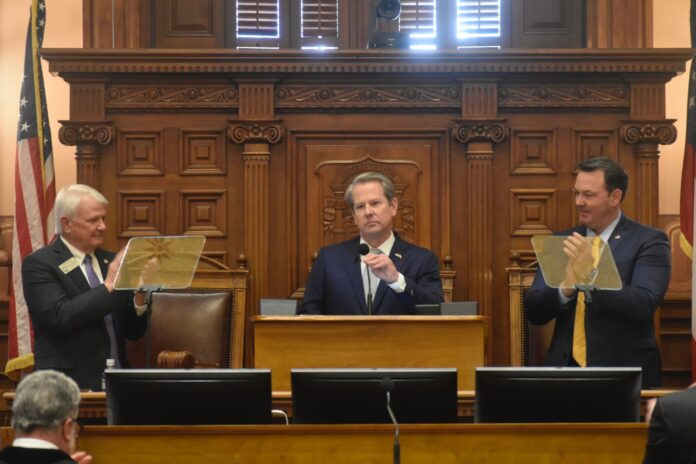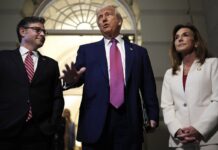
(GA Recorder) — Georgia’s state economist told lawmakers Tuesday that the state is likely to have a mild recession this year if there is one at all.
Robert Buschman, who was named the new state economist in the fall, defended the governor’s conservative revenue estimate and the stockpile of surplus cash as he offered a cautious economic outlook.
Buschman said he was troubled by lingering inflation, which has eased but is still elevated, and the anxious posture of the Federal Reserve. He said rising labor costs, higher mortgage rates and post-pandemic office vacancy rates are also worrisome economic signs.
“In summary, the economic outlook that went into the budget estimates is this: A mild recession is more likely than not beginning in the first half of this year,” Buschman said.
Buschman said the revenue estimate is “conservative for good reason.”
“The scenario I’ve outlined suggests pull-backs from the unprecedented revenue growth since 2020. A slowdown in the economy and a modest increase in unemployment along with much lower inflation will be a drag on nominal taxable incomes,” he said.
State revenues, which surged in the wake of the pandemic, are showing signs of slowing.

Gov. Brian Kemp has proposed a $37.5 billion amended budget for the current year, which is a $5 billion spending jump from the original budget. But he has proposed a $36.1 billion spending plan for the new budget year that starts in July.
He has proposed salary increases for teachers, police officers and other state workers, spending bumps for school security and bus transportation costs, and hundreds of millions of dollars for infrastructure projects meant to support the state’s freight and logistics traffic and speed up road construction projects.
Meanwhile, the state is sitting on more than $16 billion in surplus revenues and rainy-day fund cash. Kemp has only proposed spending nearly $2 billion of that money, using them for one-time expenses.
Kemp delivered his budget presentation virtually Tuesday from Switzerland, where he returned for a second appearance at the prestigious World Economic Forum.
“I believe that in times like these when our state is on strong financial footing, we should make careful and strategic investments to ensure we’re prepared for when times are lean,” he said from a flat screen.
The state’s swollen surplus has been a source of tension as Democrats and others argue that taxpayer money should be spent on services, like more spending on health care coverage and public education. House Minority Leader James Beverly questioned the spending level, calling previous revenue projections “underestimates” that led to the massive surplus.
Buschman countered that “as budgeters, you have to be conservative,” and he also defended the governor’s decision to hold onto billions of budget surplus.
“How we protect the budget going forward is to maintain those reserves at a reasonably high level. That’s also how we maintain AAA bond rating,” he said.
Rep. Carolyn Hugley, a Columbus Democrat, also asked Buschman to justify the wisdom of accelerating planned income tax rate cuts.

Kemp announced last year that he planned to push for a measure this session that would speed up the tax cut. Instead of dropping the rate to 5.49% as planned this year, GOP leaders will push to lower it to 5.39%. Altogether, the cut will cost the state treasury about $1.1 billion annually.
Buschman said he does not expect the huge surpluses to continue but said the unprecedented revenue growth justifies the spending bumps and tax cuts.
“Where y’all draw that line – how much you give back to taxpayers versus how much you increase spending – is a political choice,” he said.
Before Kemp named Buschman the state economist, he was the interim director of Georgia State University’s Public Finance Research Cluster and associate director for the university’s Fiscal Research Center, where he had a key role in examining the revenue impact of bills under the Gold Dome.
The governor unveiled his spending proposal last week, handing it off to lawmakers who are limited by the revenue estimate Kemp sets and can only move money around. But as last year showed, the governor can always strike out changes made during the legislative process with a line-item veto.
Lawmakers are hearing from state agency heads through Thursday. The schedule can be found here.
The state’s top budget writers offered up Tuesday that good economic times can easily translate into a difficult budget process.
“This might be the hardest one we’ve looked at yet,” said Sen. Blake Tillery, a Vidalia Republican who chairs the Senate Appropriations Committee.
“I’ll agree because everybody in here keeps asking for funds,” said Tillery’s counterpart in the House, Dublin Republican Rep. Matt Hatchett.







